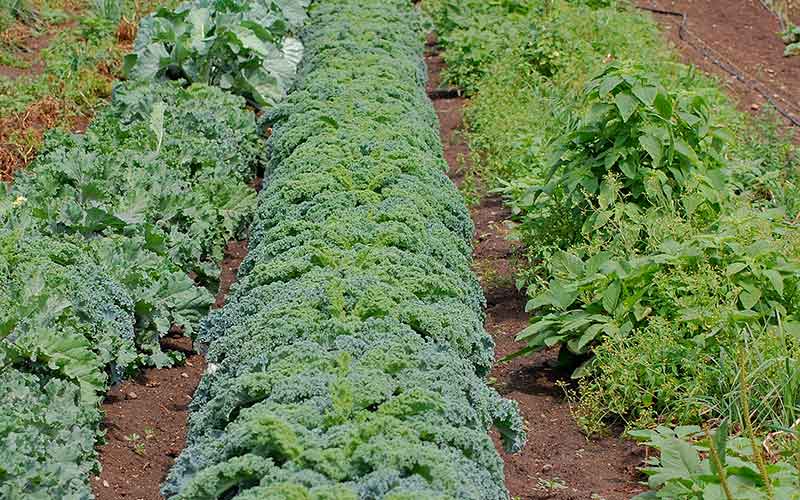
New England's farming landscape is in the midst of a change thank to the buy-local movement. CLF's Legal Food Hub can help farmers take advantage of new opportunities. Photo: Emily T. Staff
 Scott Soares has seen the opportunities and challenges facing New England’s farmers and food businesses firsthand. He served as Massachusetts’s first aquaculture coordinator in 1996 and was later appointed state agriculture commissioner by Deval Patrick. In 2012, he became executive director of the Cranberry Marketing Committee, which gave him inside look at the branding and marketing side of food businesses. He most recently served as State Director for USDA Rural Development overseeing service delivery in Massachusetts, Connecticut, and Rhode Island. Now, he’s helping CLF’s Legal Food Hub raise awareness of the program among Rhode Island’s agricultural community. He sat down with us to talk about his long view of the regional food movement.
Scott Soares has seen the opportunities and challenges facing New England’s farmers and food businesses firsthand. He served as Massachusetts’s first aquaculture coordinator in 1996 and was later appointed state agriculture commissioner by Deval Patrick. In 2012, he became executive director of the Cranberry Marketing Committee, which gave him inside look at the branding and marketing side of food businesses. He most recently served as State Director for USDA Rural Development overseeing service delivery in Massachusetts, Connecticut, and Rhode Island. Now, he’s helping CLF’s Legal Food Hub raise awareness of the program among Rhode Island’s agricultural community. He sat down with us to talk about his long view of the regional food movement.
What changes have you seen in New England’s agricultural sector during your career?
For most New England farmers today, it’s no longer about simply growing a crop and sending it off to the wholesaler to sell and market. Today’s consumers want to make a connection with farmers. They want to know where their food comes from – not only who produced it, but how it was produced. This consumer-driven “buy-local” movement has created great opportunities for growers to diversify their businesses. Now, a dairy farmer might not just produce milk; they may also decide to make cheese or yogurt or some other value-added product. An apple orchard might not just sell apples, but also open a pick-your-own operation.
But going from a farm that traditionally just grew the crops to one that is now interacting directly with consumers raises a whole new set of legal questions – ones that farmers and food businesses don’t always know they should even be asking. So there’s a lot of education that has to happen with the farming community as well as legal service providers.
And that’s where the Legal Food Hub can come in?
Yes. I’ve seen from my experience that, often, farmers and food businesses only seek legal help when it’s too late. They’re already facing mounting legal bills that could have been avoided if they had gotten assistance earlier.
Especially now, with new legal questions coming up as farmers and food businesses diversify, any help that they can get ultimately puts them in a better position to succeed. That then puts us all in a better position to have more access to locally grown food here in New England. That’s one of the reasons I got involved in the Legal Food Hub here in Rhode Island – the Hub is helping farmers not only improve their businesses but ensure that their way of life can continue into the next generation and the next.
I see the Legal Food Hub becoming even more of a need as we start to look at things like liability, tax issues, employment law, and immigration issues that affect farm labor.
What are the most significant challenges in growing New England’s local food movement?
For the newer wave of farmers coming in, access to capital and access to land are significant barriers. Rhode Island, Connecticut, and Massachusetts have some of the highest land costs in the country because our populations are so dense. But, at the same time, that high population creates a built-in direct-to-consumer market opportunity.
So, this is another area where the Legal Food Hub is helping: succession planning for current farms. For many farmers, the land and their farm business is their only retirement fund. And the land is worth a lot.
To the extent that the Legal Food Hub can help farmers with succession – whether it’s passing the farm onto children or someone outside the family – that’s critical because once land is no longer farmed but developed for non-agricultural uses, it will likely never be farmed again. So we have to work to keep farmland accessible and affordable for the next generation of farmers.
When you’re out talking with farmers and food businesses, what is the mood? Are they optimistic? Worried? Somewhere in between?
I think it’s split, really, depending on who you talk to and the segment of the industry that they’re in. For the newer farmers – folks who might be setting up their own herb or flower farms or small vegetable operations – there’s a lot of optimism. They’re starting fresh with a brand-new business, and they see the opportunities.
For others who have been in the industry longer, the buy-local movement has created a very attractive climate for growers, but that often means changing the way they do business. They need help making the transition away from older, more familiar business models that just don’t work as well anymore.
We’ve talked a lot about farmers, but what about the lawyers who are volunteering for the Legal Food Hub? What benefit do you see for them?
The Legal Food Hub has created this growing cohort of law firms and lawyers throughout New England who want to learn more about farming and food businesses. They see that the issues they deal with for other industries are also relevant to the Ag industry. Now we have this group of legal professionals who are thinking about those issues and how to help. For example, an issue with employment law came up for a farm business in Massachusetts and one of our volunteer law firms put together a legal guide to help other folks. And we now have an attorney working on the same kind of publication for Rhode Island that will be disseminated broadly.
Beyond educating the Ag and food production communities about legal issues, our volunteer lawyers are also another ambassador to educating consumers about what it really takes to put a plant in the ground, cultivate and harvest it, and get it to market.
The Legal Food Hub is currently active in Connecticut, Maine, Massachusetts, and Rhode Island. In addition to matching eligible farmers and food businesses with free legal help, the Hub offers workshops for farmers and food businesses on common legal issues, as well as CLEs and other educational opportunities for lawyers. Find out more at www.legalfoodhub.org.



